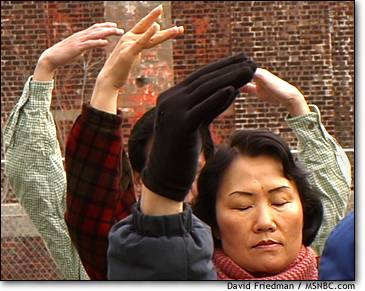


By Sean Federico-O'Murchu MSNBC
NEW YORK, April 3 - What do a drummer who played with David Bowie and the B-52s, a senior software engineer at a Wall Street firm and a researcher in biochemistry with a leading New York hospital have in common? Nearly every day, they spend at least an hour practicing Falun Gong, the Chinese "self-cultivation" exercise they claim improves mental and physical health.
They are among the thousands of devotees around the United States who have embraced this controversial Eastern practice, one that the Chinese government has denounced as an "[Chinese government's slanderous term omitted]" and that others question over claims it cures terminal illnesses.
For Sterling Campbell, Scott Chinn and Feng Ching, the rewards of Falun Gong - also known as Falun Dafa - are sublime, an almost miraculous change in temperament and sensibility, a shedding of negative attitudes and energy, a feeling of compassion and tolerance.
"After I learned these exercises, I don't feel tired, I don't suffer from fatigue," says Feng Ching, a research fellow in biochemistry at Sloane Kettering hospital.
"It's so energizing, so purifying. It reduces stress," says Scott Chinn, the software engineer who works on Wall Street. Chinn also is the vice president of the New York Falun Dafa organization, set up to highlight the human rights violations against the movement in China.
"I stopped drugs, alcohol, cigarettes. I'm in a much better state of mind. I'm a much more happy person, much healthier," says Sterling Campbell, the drummer.
Practice Makes Perfect
The three have embraced a practice that has spread rapidly from China to 40 countries in less than a decade.
It all began, according to the Falun Gong practitioners, with Li Hongzhi, a former grain clerk in Jilin province, who formulated a series of five exercises and introduced them in China in 1992.
Drawing from the deep well of ancient [...] practices as well as the meditative exercises known as qi gong, Li published his teaching in a book, Zhuan Falun (Revolving the Law Wheel), now the veritable bible for the movement.
(Falun Gong adherents discourage the use of religious terminology, insisting they are practitioners - not members - of a spiritual movement, not a religion.)
In any event, Li - known as Mr. Li, the Teacher or Master Li - set out the core teachings in his book and practitioners are encouraged to read it while moving toward the essence of Falun Gong, a life filled with "truthfulness, compassion and forbearance."
Falun Gong spread quickly across China, at first with the grudging tolerance of the Chinese government. But when 10,000 practitioners turned up in Zhongnanhai, the Beijing residential area of the [party name omitted] Party elite, in April 1999 to peacefully protest the harassment of some adherents, the government took notice.
The result was a ban on the organization, a vigorous propaganda campaign against Li and the imprisonment and the arrest and torture of hundreds of practitioners.
In December, Amnesty International reported that at least 77 Falun Gong followers have died in custody, or shortly after release, in suspicious circumstances since the crackdown began in July 1999, many as a result of torture or force-feeding while they were on a hunger strike.
China's response has drawn widespread international reproach, and threatened Beijing's ambitions to host the Summer Olympic Games in 2008.
The persecution of Falun Gong members also has strained relations with the United States, which granted residency to Li and refused to extradite him to China to face trial.
A Matter Of Size
Ironically, the crackdown has helped spread word of the practice beyond China's borders, although the size of Falun Gong support base remains in doubt.
The movement's Web sites and brochures give prominent play to claims that Falun Gong has 100 million practitioners, which would rank it fifth in size among the world's top religions, below Christianity, Islam, Hinduism and Buddhism - and above Sikhism and Judaism.
Scott Chinn, who explained that the 100 million estimate came from a Chinese government sports minister, disputes the categorization among religions, insisting that there is no formal Falun Gong organization.
[...]
Whatever its size, Falun Gong has gained a great deal of attention in the West - and a devoted following.
The practice has spread to more than 100 cities and towns across the United States. In New York alone, dozens of practices are organized throughout the city daily.
Following Falun Gong
On a bone-chilling spring morning in Manhattan, MSNBC.com spent time with followers at three different locations where practitioners ranged from elderly ethnic Chinese gathering in Chinatown to Wall Street types in Battery Park City.
At each location, Li's voice rang out from small boom boxes guiding the adherents through the five exercises. And practitioners were united in hailing the benefits of the Falun Gong, explaining that the exercises help them become better, healthier people.
"I have better relationships, a lot of my anger is dissipating. I'm doing unselfish things that I didn't do before," noted drummer Sterling Campbell.
Campbell joined about 60 other practitioners across the street from the Chinese consulate on 42nd Street, where they gather twice a week to protest the Beijing crackdown.
There also was little hesitation in trumpeting claims of the health benefits. "There's many, many, many practitioners who have cancer, chronic fatigue syndrome, things like that (which) after they started practicing disappeared," said Chinn.
Kevin Wu, a Beijing native who works with Chinn on Wall Street, noted that his knee injury cleared up after he began practicing. "When your mind starts thinking clean thoughts, your body is actually purified," he said.
Feng Ching ascribed the health benefits to "superscience." She added, "It's above our knowledge. But it works, because I know it works."
Category: Falun Dafa in the Media





